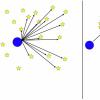A couple more papers on autophagy and the mechanism of action in this context of vitamin D (normalizing, it was not me voting you down):
Autophagy induction by vitamin D inhibits both Mycobacterium tuberculosis and human immunodeficiency virus type 1.
https://www.ncbi.nlm...pubmed/22892387
"Low vitamin D levels in human immunodeficiency virus type-1 (HIV) infected persons are associated with more rapid disease progression and increased risk for Mycobacterium tuberculosis infection. We report that physiological concentrations of 1α,25-dihydroxycholecalciferol (1,25D3), the active form of vitamin D, inhibits M. tuberculosis and HIV replication in co-infected macrophages through human cathelicidin microbial peptide-dependent autophagy that requires phagosomal maturation. These findings provide a biological explanation for the importance of vitamin D sufficiency in HIV and M. tuberculosis-infected persons, and provide new insights into novel approaches to prevent and treat HIV infection and related opportunistic infections."
Impact of vitamin D on immune function: lessons learned from genome-wide analysis.
https://www.ncbi.nlm...pubmed/24795646
"Immunomodulatory responses to the active form of vitamin D (1,25-dihydroxyvitamin D, 1,25D) have been recognized for many years, but it is only in the last 5 years that the potential role of this in normal human immune function has been recognized. Genome-wide analyses have played a pivotal role in redefining our perspective on vitamin D and immunity. The description of increased vitamin D receptor (VDR) and 1α-hydroxylase (CYP27B1) expression in macrophages following a pathogen challenge, has underlined the importance of intracrine vitamin D as key mediator of innate immune function. It is now clear that both macrophages and dendritic cells (DCs) are able to respond to 25-hydroxyvitamin D (25D), the major circulating vitamin D metabolite, thereby providing a link between the function of these cells and the variations in vitamin D status common to many humans. The identification of hundreds of primary 1,25D target genes in immune cells has also provided new insight into the role of vitamin D in the adaptive immune system, such as the modulation of antigen-presentation and T cells proliferation and phenotype, with the over-arching effects being to suppress inflammation and promote immune tolerance. In macrophages 1,25D promotes antimicrobial responses through the induction of antibacterial proteins, and stimulation of autophagy and autophagosome activity. In this way variations in 25D levels have the potential to influence both innate and adaptive immune responses. More recent genome-wide analyses have highlighted how cytokine signaling pathways can influence the intracrine vitamin D system and either enhance or abrogate responses to 25D. The current review will discuss the impact of intracrine vitamin D metabolism on both innate and adaptive immunity, whilst introducing the concept of disease-specific corruption of vitamin D metabolism and how this may alter the requirements for vitamin D in maintaining a healthy immune system in humans."
(next to the autophagy stimulation, this second paper in particular emphasizes the possible genetic factors in immune response to vitamin D, e.g. see "... However, improved sputum conversion time was observed in a specific subset of TB patients with a Taq1 single nucleotide polymorphism (SNP) within the VDR gene (Martineau et al., 2011), suggesting that genetic factors may influence immune responses to vitamin D supplementation..."
Insights into battles between Mycobacterium tuberculosis and macrophages.
https://www.ncbi.nlm...pubmed/24938416
"As the first line of immune defense for Mycobacterium tuberculosis (Mtb), macrophages also provide a major habitat for Mtb to reside in the host for years. The battles between Mtb and macrophages have been constant since ancient times. Triggered upon Mtb infection, multiple cellular pathways in macrophages are activated to initiate a tailored immune response toward the invading pathogen and regulate the cellular fates of the host as well. Toll-like receptors (TLRs) expressed on macrophages can recognize pathogen-associated-molecular patterns (PAMPs) on Mtb and mediate the production of immune-regulatory cytokines such as tumor necrosis factor (TNF) and type I Interferons (IFNs). In addition, Vitamin D receptor (VDR) and Vitamin D-1-hydroxylase are up-regulated in Mtb-infected macrophages, by which Vitamin D participates in innate immune responses. The signaling pathways that involve TNF, type I IFNs and Vitamin D are inter-connected, which play critical roles in the regulation of necroptosis, apoptosis, and autophagy of the infected macrophages. This review article summarizes current knowledge about the interactions between Mtb and macrophages, focusing on cellular fates of the Mtb-infected macrophages and the regulatory molecules and cellular pathways involved in those processes."



















































